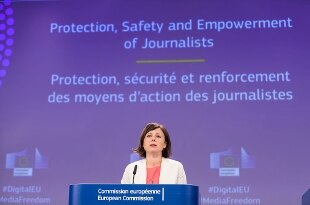Giuseppe Giulietti (FNSI): "Attacks against journalists on the rise, parliament act"
Peter de Vries, the journalist injured in an ambush in Amsterdam, died
Share
16 September 2021 The European Commission has asked Member States to more decisively counter the growing episodes of violence against journalists, who have suffered more than 900 attacks in the EU in 2020 alone.
These crimes "include injuries, insults, online and offline harassment, destruction of equipment and cars," Commission Vice President Věra Jourová said at a press conference. Since 1992, 23 journalists have been killed in the EU, with the majority of the killings occurring in the past six years.
In addition to "investigating and prosecuting all criminal acts with determination, making full use of existing national and European legislation", the EU executive encouraged national governments to "involve European authorities, such as Europol and Eurojust". "It is also essential - reads a note from Palazzo Berlaymont - that the media have non-discriminatory access to information, including press conferences and documents held by public authorities".
Almost one in three incidents occur during protests, "making demonstrations the most frequent place where journalists were attacked in 2020", highlights the EU document. Hence the recommendation to Member States to "provide regular training to the authorities to ensure that journalists and other media professionals can work safely and unrestrictedly during such events". Also recommended is the appointment of liaison officers to inform journalists in advance of potential risks.
"Digital and online security has become a major concern for journalists due to hate speech online, threats of physical violence, as well as cyber security risks and illegal surveillance," reads the recommendations text. The Commission therefore calls for "promoting cooperation between online platforms and organizations with experience in dealing with threats" against professionals in the sector. Journalists and journalists from minority groups "are particularly vulnerable to threats and attacks".
Journalists, in particular, "face more threats than their male colleagues and 73% said they have experienced online violence in the course of their work". The recommendation therefore urges Member States to support women's empowerment initiatives also in journalism, with particular attention to minority members as well as "promoting equality and inclusion in newsrooms and the media industry as a whole".
The EU says it is ready "to support the Member States, from a technical and financial point of view, in the implementation of the actions envisaged by the recommendation" with the 75 million euros from the Creative Europe program in projects on media freedom and pluralism. Among the best practices encouraged by the EU document of coordination centers dealing with attacks against journalists, such as the offices already existing in Italy, Sweden and the Netherlands.

